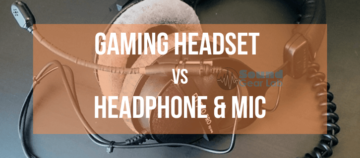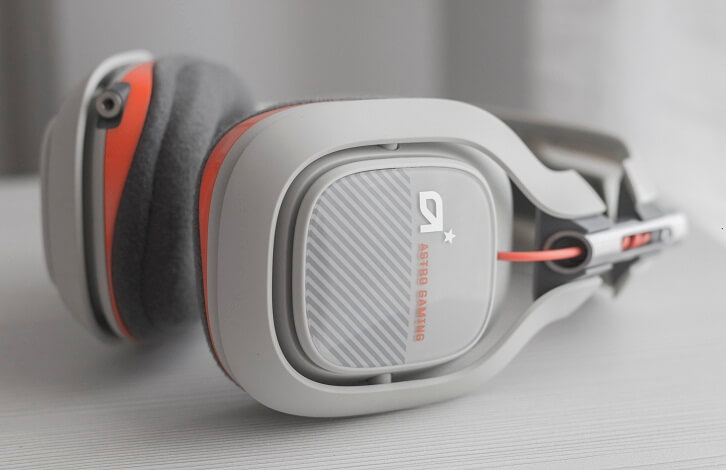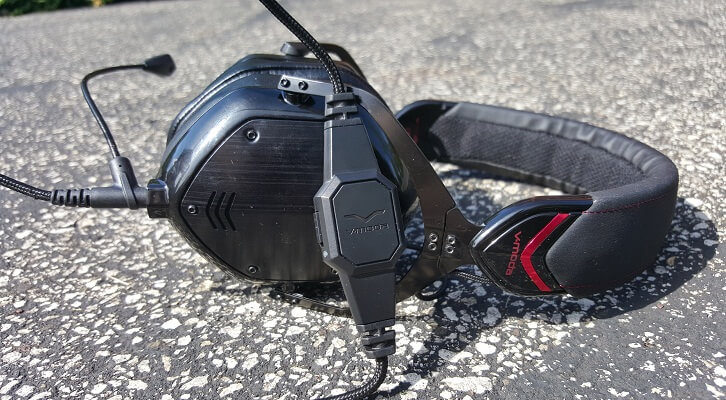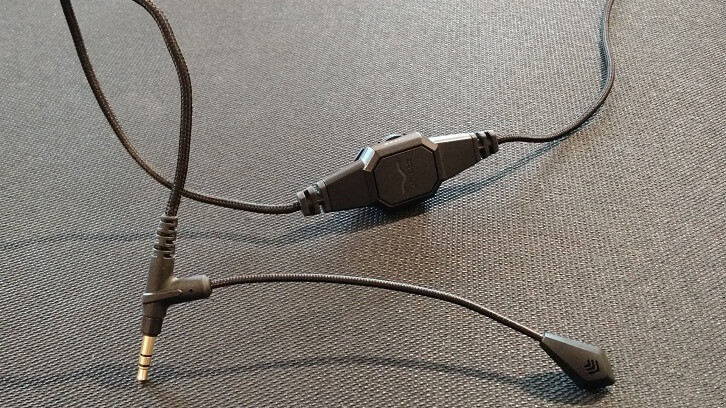How to Charge AirPods Without a Case
Discover the truth about how to charge AirPods without a case. Uncover myths, find alternatives, and safeguard your audio experience.

While you are thinking hard about the monitor, CPU, and video card combo to get so your games will look exactly how you want them to; it can be very easy to forget how they will end up sounding. When you do remember to get an audio system for your setup, it can be quite a long search to get a gaming headset or a good gaming headphone that matches up to your expectation.
Early this year I was faced with the same challenge.
I decided to stop using the mic on my Chromebook and get new headphones. But I wasn’t sure if I should get a gaming headset or should I get a good headphones plus a mic (or even a gaming chair with speakers built-in)?
This is a question most gamers ask. For me, after carefully weighing down these two options against my needs, I decided to get a new headphone and a mic.
You see, your choice of whether to buy a gaming headset or buy a headphone and a mic to match it depends on your needs. Sure, both come with their benefits, but when choosing which to get, you have to weigh your options against both the advantages and disadvantages of each.
Below I have outlined the benefits of a gaming headset and a headphone and mic to help you make an informed decision. Plus, I have included a buying guide to assist you in making a smarter choice.

Astro Gaming A40 | Enrique
At their simplest level, headsets are headphones with a microphone attached.
But, gaming headsets are another thing altogether – at their best they will strive to offer clear communication, noise isolation, immersive sound, enhanced comfort, and often employ colorful sound designs to provide an enjoyable gaming experience.
Choosing a good gaming headset is no walk-in-the-park – you will be surprised by the number of gaming headsets available in the market (and also by how many of them are just terrible). You really do have to go to the upper tier of gaming headsets to find one without obvious flaws.
Also, marketing terms used to describe gaming headsets can be quite overwhelming.
So, how do you go about choosing the best gaming headset?
The most important factors to consider when selecting a gaming headset are:
For a gaming headset, comfort is paramount. With the amount of time you are going to spend on your next adventure, which is unknown, it is crucial the headset you pick does not weigh down on you.
Choosing a good gaming headset is important as it can give you an upper hand or can also bring you down while playing a game.
To judge a gaming headset based on comfort, you can start by carefully analyzing the materials used in the making of the ear pads and the headband. A material such as memory foam is better as it adjusts its design to conform to your ears’ shape. Thick yet soft padding ear cups can also be a sign to look out for in selecting a comfortable headset.
Apart from the material, you should also check the design of the headset to make sure it offers good adjustment levels, and the overall weight should not be too heavy to wear on your head for long hours on end
How crazy would an uncomfortable gaming headset be on your head? Gaming headsets for people with larger heads can be a good idea if you find your headset clamps too hard on your large noggin.
It goes without saying; a comfortable gaming headset is a MUST.
The sound quality of a headset is another feature you should check out for in a good gaming headset. Your gaming headset should be as important as its gaming graphics.
Unlike regular headphones, gaming headsets give you wide surround sound which aids in making a virtual game realistic and lifelike. Some gaming headsets or headphones will always come with simulated surround sound.
For gamers who play FPS games, simulated surround sound is important because it can quickly help you locate the position of the enemy. A headset or headphone capable of powerful bass is also a must-have for FPS games. This is because the sounds from explosions or gunfire are brought to life.
Another handy feature that some gaming headsets (even budget gaming headsets) have is noise cancellation. By the use of an external microphone, any outside noise is inverted thus canceling it. This feature comes in handy for games that require your full concentration so you can play without distractions from the real world.
When you decide on your pair of gaming headsets, you expect to have them on for a more extended period. Some manufacturers will often ignore the build quality and provide a cheap, low-quality gaming headset. Usually, this means you will be buying a headset replacement in a few months.
Instead of going this route, you can always invest in a quality headset that is sure to last you a longer period.
In most cases but not all, the price of a headset usually is a fair representation of its quality.
But this does not mean you should go investing your hard earned money in buying expensive gaming headsets – do your research first.
For example, I found that that A50 gaming headsets (priced at the top of the market) have some of the worst sound quality of any headset I’ve ever heard. But the less expensive Hyper X Cloud II headset (still expensive though) was a delight in every way.
Most of the time, the cost of marketing a product can have a significant impact on the price. A $300 headset could be worth less than $150 in hardware, but due to the cost of marketing, the product is sold at a higher price to ensure a better profit margin for the manufacturers.

V-Moda Crossfade Headphones with Boom Pro Microphone | Shawn Zipay
A headphone and mic combo means getting regular headphones (see our best closed-back headphones) and an external mic that could be attachable to the headphone for a better gaming experience.
Unlike a gaming headset, with regular headphones, you have to shop for both good headphones and a good microphone (assuming you need to walk).
With that said, I will cover a guide on how to check for the best microphone for gaming. With headphones, you can check out our detailed headphone buying guide.
See Our Best Open-Back Headphones for Gaming

V-Moda BoomPro Microphone | Z Reviews
When you are shopping for a mic, you will come across a range of different mics at different prices. Since gaming is no longer a one-person game, getting a mic is necessary to enable communication between you and other gamers. A microphone will not only help you interact with other players, but you can also use a headset with a mic for live streaming and gaming commentaries.
A microphone’s form factor can be divided into two distinct categories, a detachable mic or an external mic.
A detachable gaming mic is ultra-portable, suitable for those gamers who are on the move.
With an external mic, you get more than just gaming with it. You can use the mic for YouTube (If you are a YouTuber). One thing that keeps me away from external mics is that they are going to be seen all the time, thus making them more of a distraction.
If you want recommendations for gaming headset without mic or with detachable mic, see this article.
Most gaming headset mics are unidirectional; this means they only accept sound from a single direction. This is quite advantageous as other gamers on the other end will not be able to hear other noises from your house.
A bi-directional mic sometimes called a Figure 8, is a type of mic that picks up sound from the front and back equally but, nothing from the sides. In gaming, bi-directional mics are preferred as the sound transmitted is richer than a unidirectional mic.
With omnidirectional mics, the mic records everything in a 360 degrees pattern. An omnidirectional mic could come in handy if you are constantly changing your position while gaming. Omnidirectional mics would not be good if used in a noisy environment because they record everything.
With connectivity, there are two main types: wired and wireless.
Wired microphone connections can further be broken down into other input categories such as USB, 3.5 mm connector, etc.
TRS and XLR cables are the popular options that also allow you to experience better sound quality but most modern gaming mics will likely be USB microphones.
To increase the compatibility of your mic to your current setup, you can get yourself an adapter that will allow even a bigger threshold for your microphone compatibility.
If you want to connect your USB microphone with your Xbox One, we also have a guide here to help you.
Selecting between a gaming headset and a headphone and mic combo is one tough decision. Of course, you have to weigh down the options you have to make sure you get something you can live with for the longest.
With that said, here are some deciding factors to help you make an informed decision.
A gaming headset will be a great choice if you are a gamer. It offers much more than a standard headphone would. For example, you can enjoy the virtual surround sound that comes with most gaming headsets, you can opt for a wireless experience and you can have an all-in-one experience.
However, if you are not just a gamer but also a person who enjoys listening to (or even producing) music, a gaming headset will not satisfy you (unless you go premium). In this case, a pair of quality headphones paired with a mic would be much more convenient than getting a gaming headset.
Headsets, especially gaming headsets repulse many users. The gamer-inspired aesthetics of most headsets make them mostly for use when gaming.
If you are traveling by plane, I suggest using the headphones that are provided by the airlines, unless you want to look like a goof wearing gaming headsets.
However, there are some gaming headsets with better looks that could pass off in the streets and come with a detachable microphone but you’ll generally want to stick to regular headphones if you plan to wear them much in public.
Some people enjoy the choice of getting a gaming headset and a headphone. However, if you are on a tight budget choosing would be the only option. So, which would you choose?
This again boils down to the purpose and personal preferences. If you are into gaming, a gaming headset would be the right choice. But, in case you wish to also listen to music or mixing, buying a regular headphone and a detachable microphone will do just fine.
When it comes down to the cost, a headset will be the budget option. Looking around, whether, on Amazon, Walmart or other electronic sellers, I found gaming headsets to be much cheaper than when buying a headphone and a mic.
Overall, headphones generally sound much better than a gaming headset (see our guide on how to use regular headphones on XBox). If you are looking for sound quality and not virtual surround sound in gaming headsets, then a pair of headphones is likely the best.
Apart from the sound output from the headphone, the sound from the mic is also something to consider.
From experience, mics in gaming headphones sound awful (unless you go for a premium, option like the HyperX Cloud II). A gaming headset mic is more likely to sound distorted and comes off as a nuisance to even other gamers. On the other hand, a separate attachable mic is a better option.
Above you’ll find our favorite products for either a wireless gaming headset (Hyper X Cloud II) or a headphones / mic combo (the Meze Neo 99s paired with the Blue Yeti USB Mic).